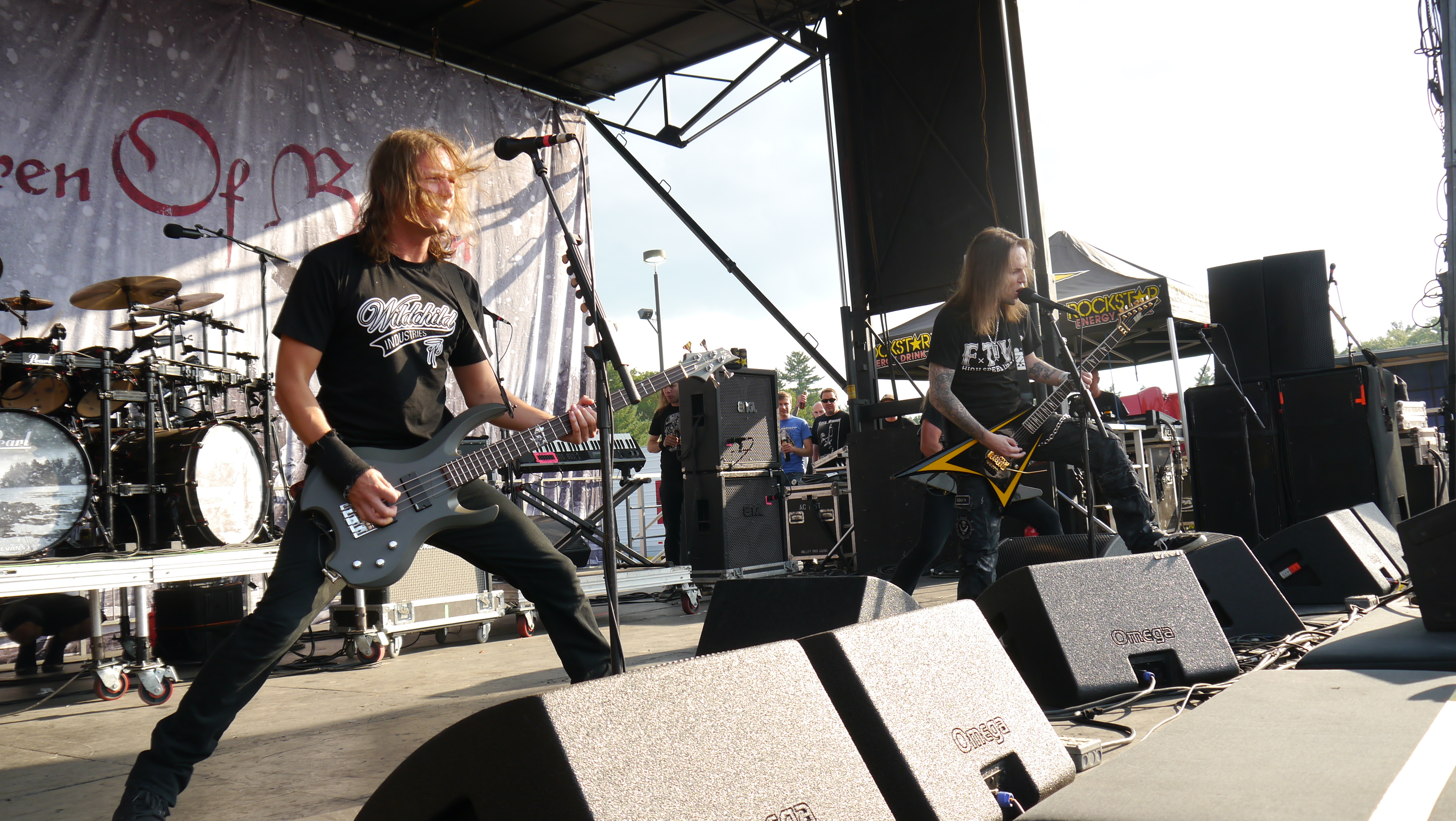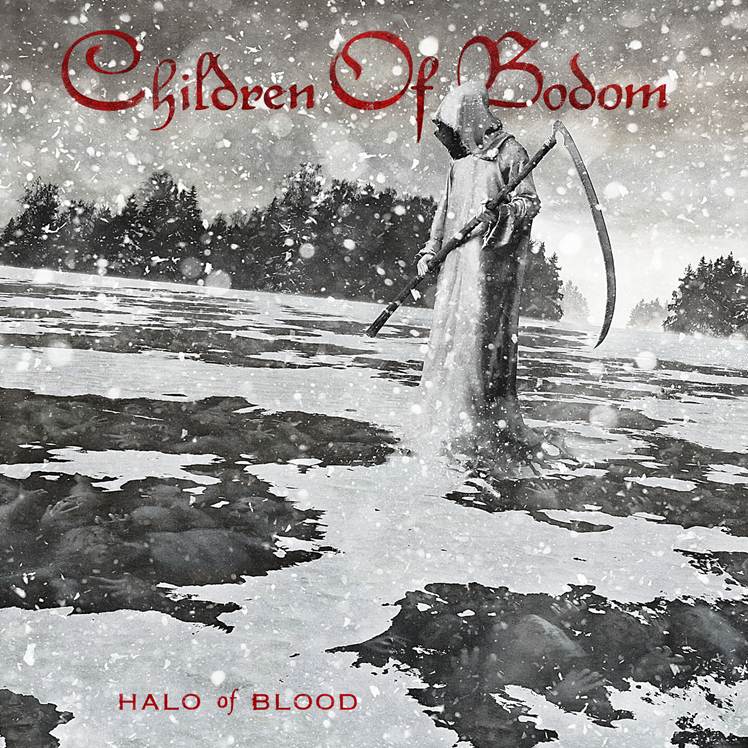Speaking to Bodom's Children - A Conversation with Henkka Seppälä
Children of Bodom has always been treated as a work solely of frontman Alexi Laiho. His vocals and guitar theatrics and songwriting dominate each of the band's releases, and "Halo of Blood" is no different. But behind Laiho stands one of the most talented bands working in metal today; adaptable, versatile, heavy, melodic, anything they need to be. Hidden in the shadows of CoB stands Henkka Seppälä, bassist and generally amiable guy. In search of his story, we sat down recently as Mayhem Fest.
M.DREW: Tell me about “Halo of Blood.” It’s the big new thing, it’s your big, new album, what’s its inspiration? What’s the theme?
HENKKA SEPPÄLÄ: The music always comes from the same place. Alexi [Laiho] prepares stuff from his head and then we make songs the same way we’ve always done. Lyrically, he’s dealing more with some personal stuff, with some people who have been losing lately, some good friends. That led to other songs, and songs about losing somebody, which is a new topic for us.
M.D: Over the band’s twenty years - Did you ever think this band would go twenty years?
HS: No, of course not. No, no, no, that’s a ridiculous thought.
M.D: What do you credit your success to?
HS: We been working hard. We never compromised anything, we just did this as the first priority for everybody. We’re fortunate to be in a position where we could do that because we started so young. We never had to think about, like, can I go on tour because I might lose my job? We were so young we weren’t working yet.
M.D: Back to it, over the twenty years, how would you describe the way the sound of the band has evolved from when you started up until “Halo of Blood?”
somebody from the outside.
M.D: I think the press tends to concentrate on Alexi first and foremost when talking about Children of Bodom. How good is the rest of the band? How talented are the other members of this band? They’ve got to be top notch, too, right?
HS: [Laughs] Yeah, but you know what, he’s the main figure of the band and he’s the


HS: We always approach it the same way. For us it’s hard to say. Of course, everybody evolves as musicians all the time. But it’s easier to ask it from a fan who has been following us the whole time. We never tried anything different or, you know, took a new direction. It’s better to ask songwriter, and the lead guitar and the singer. There’s four good reasons to be focused on him and we’re happy with that. We can just chill.
M.D: When you talk about metal from Scandinavia, there’s a lot of tropes and gimmicks that get talked about. It seems like you guys and Hypocrisy are the two bands that are not especially black metal and not super over the edge power metal. Do you ever look around at your contemporaries and wonder why you’re the only band standing alone?
HS: No. [Laughs] We don’t really look at it that way. When we started, we started as a – what’s the word in English? – like, a weird mixture of everything. When we started, we never part of anything. That’s why when the first album came out, we were sure nobody would like it because it’s too fun for black metal people and it’s too black metal for power metal people and it’s too death metal for thrash people and so on. I think we’ve always been on the outside of all these things.
M.D: Amidst all the folklore and myth of Finland, is it every tempting to go down that road and draw on that for inspiration, or do you stick strictly to reality-based material?
HS: Well, Alexi’s in charge of the lyrics, but I don’t think we would ever be interested in doing that. There’s a lot of bands who are doing it and that’s all fine, I totally respect our folklore even though it doesn’t go very far into history, it’s mostly a couple hundred years ago. I don’t see any reason for us…for us, [writing] is like a therapy session, get the bad air out.
M.D: So you typically feel better after a recording session, you feel healed in a way?
HS: Yeah.
M.D: What’s that like? For someone who’s never going to experience it, what’s it like to look out from the stage and see fifteen or twenty thousand people gathered to see you?
HS: It’s an amazing feeling. It’s always, always great. It’s hard to…it’s really, really good. That’s the best part of the whole thing.
M.D: It has to be asked – you guys have been known for some fairly eccentric cover songs over the years, who decides what to cover, and how does that happen?
HS: Yeah. It’s always hard to come up with the ideas. Somebody usually brings some ideas. There’s been a lot of weird ideas thrown in. It’s hard to choose.
M.D: Is there a particular band that you pay homage to? Is there somebody who really inspired your music and made the cover mandatory?
HS: Maybe in the beginning, like we did WASP or King Diamond back in the day. Sepultura, these are more as a tribute. But nowadays, it’s more about finding something interesting and challenging as a musician with new arrangements.
M.D: As you look around at Mayhem Fest, who are some of the younger bands that really impress you?
HS: Born of Osiris. I heard them, they caught my ear. I’ve been watching them a couple of times and they sound very tight, it’s very interesting.
M.D: You’ve seen death metal expand and grow in recent years and it seems like a genre firing off in nine different directions. What’s your impression of death metal, what should it sound like?
HS: When I think about death metal, what’s always first in my mind is like, Cannibal Corpse and Morbid Angel. That’s how I remember from my youth, you know? Obviously it’s changing all the time, which is good. There’s different routes to go and like I said, first thing in my mind is Cannibal Corpse and Morbid Angel. Probably nowadays death metal is something a little different.
M.D: Maybe now it’s Children of Bodom.
HS: [Laughs] Yeah, it might be.
M.D: I ask everybody this – if we’re in your native Finland and want to eat the traditional Finnish dinner, what are we eating and what should we drink with it?
HS: A traditional meal? Finnish food culture is also quite new, there’s not a lot of traditional, traditional stuff. But local stuff? You should go for reindeer filet. Or if you don’t have time for a nice steak, reindeer stew, with mashed potatoes with some lingonberry sauce on the side. To drink, just drink a local lager.


